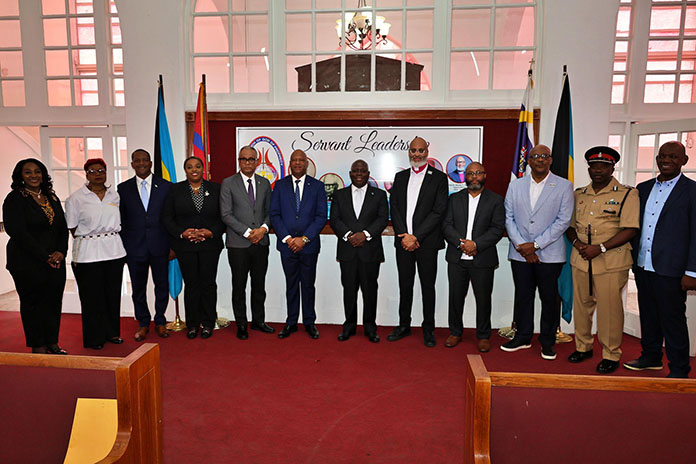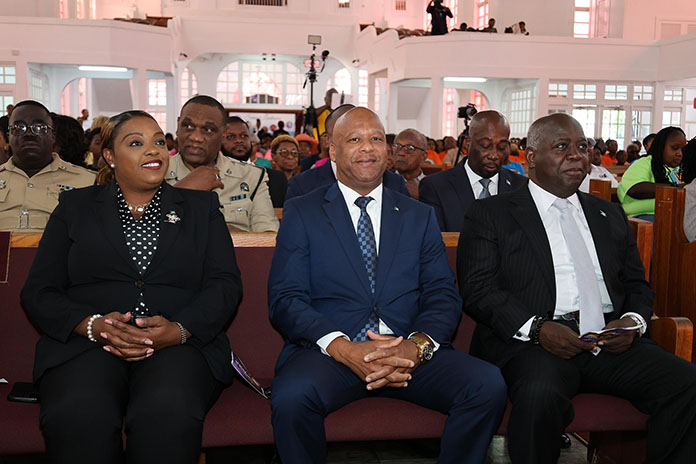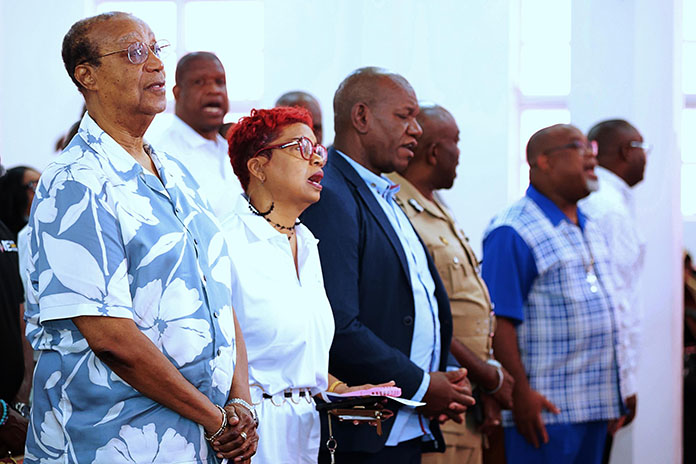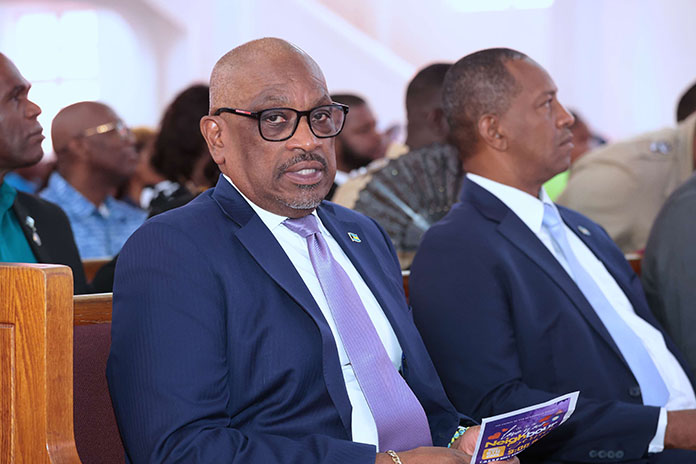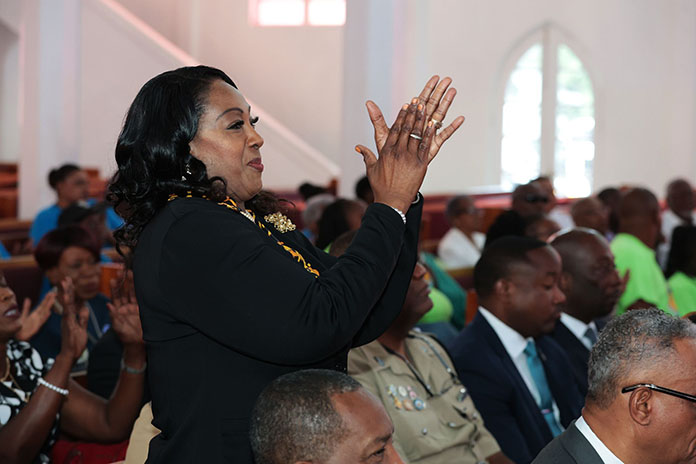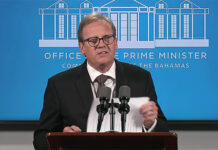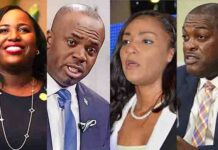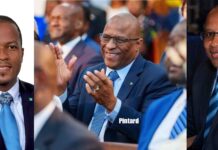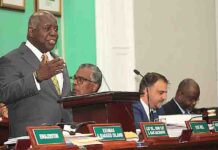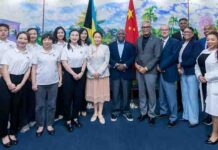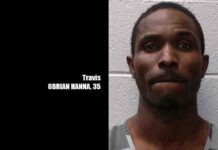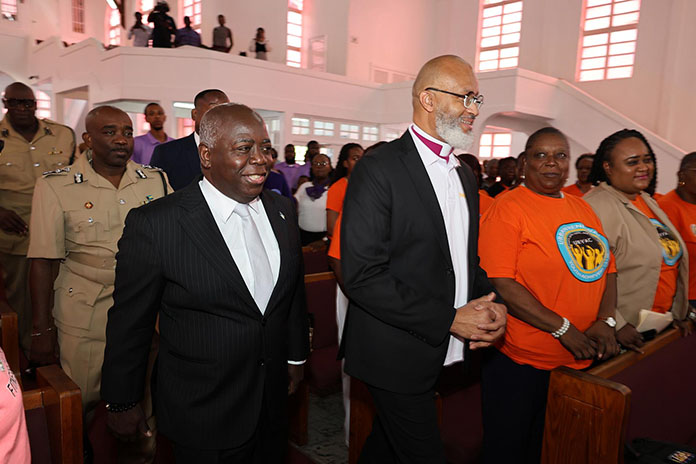
NASSAU, The Bahamas – During his Official Remarks at the Church of God of Prophecy Bahamas ‘Love Your Neighbour’ Church Service, held in conjunction with the Urban Renewal Authority, on August 6, 2025, Prime Minister and Minister of Finance the Hon. Philip Davis pointed out that Jesus did not say “love them when they agree with you”.
“He didn’t say love them when it suits you,” Prime Minister Davis said, during the church service held at the Church of God of Prophecy East Street Tabernacle. “He said love them, as yourself.”
He added: “We quote that scripture often, but I wonder how often we live it because, if we’re being honest – and I think in church we should always be honest – we’ve lost something along the way. We’ve become quick to judge, quick to condemn, quick to write people off. And in doing so, we’ve hardened ourselves.
“We’ve built walls where there used to be bridges, fences where there used to be porches, silence where there used to be song.”
Among those present were Minister of Housing and Urban Development the Hon. Keith Bell; Minister of Health and Wellness the Hon. Dr. Michael Darville; Minister of State in the Ministry of Housing and Urban Renewal the Hon. Lisa Rahming; Parliamentary Secretary in the Ministry of Economic Affairs Wayde Watson; Former Prime Minister the Most Hon. Dr. Hubert Minnis; National Bishop of the Church of God in The Bahamas Dr. Woodley Thompson; East Street Tabernacle Bishop Branson Gibson; Bishop Nathaniel Beneby; Bahamas Christian Council President Bishop Delton Fernander and other members of the clergy; Urban Renewal Authority Co-Chairs Algernon Allen and Rev. Dr. Diana Francis and other Urban Renewal members; representatives of the Royal Bahamas Police Force; and other stakeholders.
Prime Minister Davis noted that, growing up, “we didn’t have much; but we had each other”.
“We had the porch, that front space of the house where you’d sit and talk, where neighbors passed by and stopped in for a few minutes or two hours,” he said. “That was where love showed up. That was where we knew we weren’t alone.”
Prime Minister Davis added: “Now? We close the gates. We draw the blinds. We keep to ourselves. We’ve traded the porch for privacy, and with it, we’ve lost something precious.
“But I believe we can find it again. This moment we’re in as a country, as a people – it’s testing us, not just economically, not just socially.
“It’s testing our character.”
He continued: “It’s testing what we really believe about each other. It’s testing whether we believe that being Bahamian is enough of a reason to care about someone else. And I’ll tell you what scares me: It’s not just the crime. It’s not just the poverty. It’s not even the political tension.”
Prime Minister Davis noted that what “scared” him most was what politics “is turning us into”.
“Once upon a time, we could disagree and still share a meal,” he stated. “We could support different parties and still go to the same church, cheer for the same Junkanoo group, raise our children on the same block.”
Minister Davis added: “Today, we don’t just argue, we attack. We don’t just disagree, we despise. It’s not enough for someone to be wrong in our eyes – now we must make them out to be wicked, corrupt, irredeemable. And I want to say this clearly, as your Prime Minister, but more than that, as your neighbor: I am deeply afraid of what politics is making us become.
“If we lose civility, if we lose decency, if we begin to see every opponent as an enemy, we’re entering a different reality, one where our country can’t hold together.”
Prime Minister Davis stated that politics “should never cost us our compassion”.
“But more and more, it is,” he said. “I’ve seen good people walk away from each other over party colours. I’ve seen families grow distant because of a vote. I’ve seen church members fall silent during elections because the tension in the pews is too thick to ignore.”
Prime Minister Davis added: “We have to ask ourselves – is this who we want to be? Because it’s not who we were; and it doesn’t have to be who we become.”
He pointed out that “every single one of us is walking around with burdens, with fears, with regrets we don’t say out loud”.
“You don’t know what that woman on the bus is carrying,” Prime Minister Davis said. “You don’t know what that young man on the corner has been through. You don’t know what that angry voice on the radio is trying to heal from; but you know this: they are your neighbor.
“And if you’ve ever needed grace, then you know how powerful it can be to give it.”
He added: “Treat others the way you want others to treat you. That’s not just a moral guideline. That’s how we survive. That’s how we heal. As Prime Minister, I am expected to lead this country. But the truth is, the strength of our nation isn’t found in any one leader. It’s found in how we treat each other. Do we speak with kindness? Do we forgive when it’s hard?
Do we choose truth over gossip? Do we help, even when no one is watching? These are the questions that determine our future – not just who wins an election, not just what laws are passed.
“But how we live together – or fail to live together.”
Prime Minister Davis asked those present to search their hearts.
He said: “Ask yourself: What kind of country are we building? Are we teaching our children to love or to label? Are we forming communities based on care or on control? Are we lifting each other up or waiting for the moment to tear each other down?”
Prime Minister Davis added: “I want to believe – I do believe – that we can be better. I see glimpses of it every day. I see it in the teacher who brings extra food for a student she knows has nothing at home. I see it in the nurse who holds a stranger’s hand while they take their last breath. I see it in the church volunteer who doesn’t post what they give – because they give from the heart, not for attention. That is the spirit we need to multiply. That is what it means to love your neighbor.
He pointed out that one does not have to agree with someone to treat them with dignity.
“You don’t have to like someone’s choices to respect their humanity,” Prime Minister Davis said. “You don’t have to share someone’s story to honor their struggle.”
He added: “We can disagree. That’s democracy. That’s life; but we must never let disagreement lead us to devalue one another. I believe we’re being called back to something ancient and simple, back to the commandment, back to the porch, back to each other. When we were growing up, the porch was where everything happened. You cried there. You laughed there. You told your secrets there. You were taught your manners there.”
Prime Minister Davis noted that the porch was where neighbors became family.
“Today, we’ve replaced those porches with high fences and backyards,” he said. “We’ve replaced conversation with comment sections. We’ve replaced presence with performance.
And in that exchange, we’ve lost a part of ourselves.”
“But we can get it back,” Prime Minister Davis added. “We can decide – starting today – to be a people who love differently; a people who listen without judgment, who speak without cruelty; who serve without seeking reward; a people who hold on to the old truth: that we are our brother’s keeper. That is how we honour God. That is how we love Him – with our heart, with our soul, and with our mind.
“And we show it by loving our neighbors, not just in word, but in deed.”
He encouraged all present to go forward “not just inspired, but transformed”.
“Let us speak with more tenderness,” Prime Minister Davis said. “Let us forgive what we thought we couldn’t. Let us rebuild what we let fall apart. Let us make space again – not just on the porch, but in our hearts.”
He added: “And let our children grow up in a country where love is not rare, but routine. I want to thank you all. May God bless you. May God bless your neighbors; and may God continue to bless the Commonwealth of The Bahamas.”
